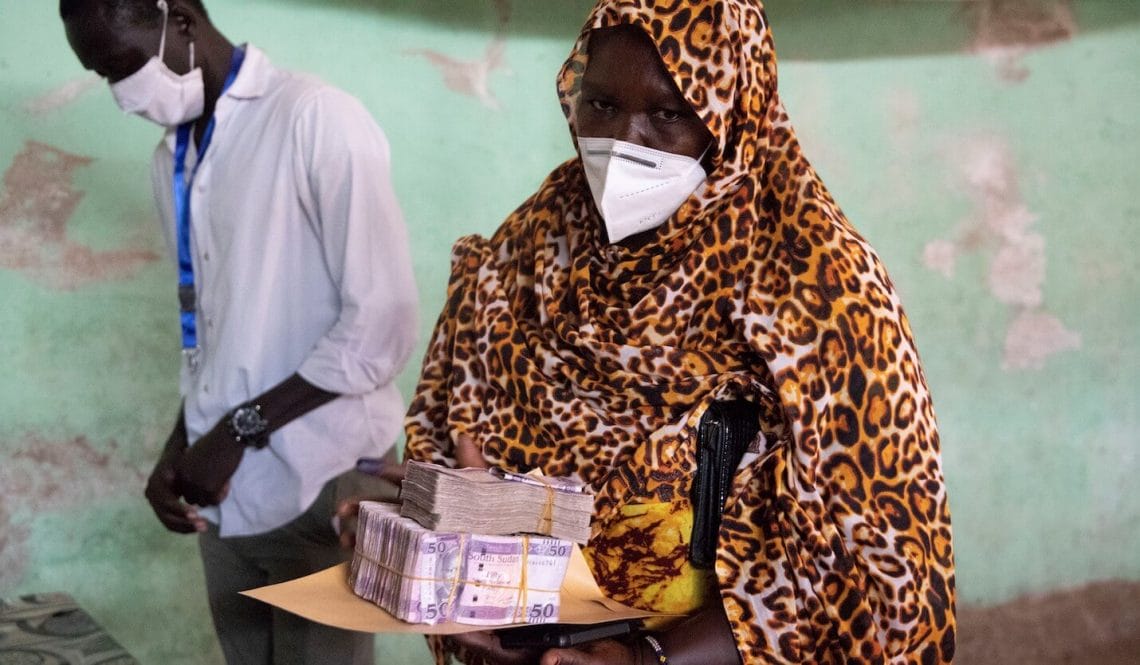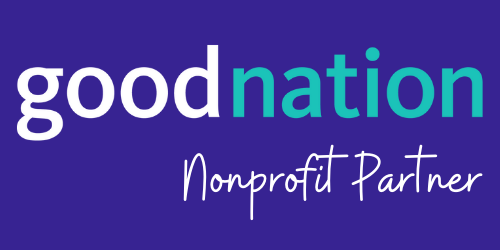
A beneficiary of the South Sudan Safety Net Project (SSSNP) after receiving her cash in Juba
Photo by Janet Maya Mulukwat, UNOPS (South Sudan)
Saving money, or spending it in ways to support long-term goals, is difficult for anyone. Living in extreme poverty makes it even more challenging and is almost inconceivable during a global pandemic that continues to disrupt lives and livelihoods.
In South Sudan, high levels of poverty, exacerbated by decades of conflict, escalating food insecurity, shortages of basic services and recurring natural disasters, inhibits planning for the future for the majority of the population that lives in in poverty. Additionally, the economic and health risks created by COVID-19, and the consequent depreciation of the South Sudanese pound (SSP) meant the value of money was constantly in flux.
The South Sudan Safety Net Project (SSSNP) was launched in July 2020 by the Government of the Republic of South Sudan, in collaboration with the World Bank that funds it and the UN Office for Project Services (UNOPS) that implements it. The SSSNP provides temporary cash assistance to protect and uplift households experiencing extreme poverty, and is accompanied by Cash “Plus” activities that provide basic trainings on topics such as how to save and manage money. The cash assistance is crucial in meeting immediate needs and strengthening recipients’ financial resilience. However, behavioral science shows that constantly dealing with shocks and worrying about depreciation can deplete the cognitive capacity recipients need to optimally use the money and training provided through the program. To this end, the SSSNP partnered with ideas42 to develop and introduce context-specific behavioral interventions to help recipients make the most of their cash.
A survey conducted with SSSNP recipients revealed that they intend to use the cash transfers for urgent needs, such as food. But they also have mid- to long-term goals, such as expanding a business or improving their home. While achieving long-term financial goals is generally difficult for all, the situation was significantly more challenging in South Sudan during the height of the rapid depreciation of the SSP in 2020, when recipients had to use the cash they received immediately to mitigate losing the value of their money. While recent economic reforms are expected to stabilize the currency, inflation remains high and continues to restrict household capacity and savings behaviors. Given these challenges, the process of setting priorities and taking practical steps to achieve future goals is far from straightforward. Key barriers are listed below:
- Allocating cash to support long-term goals requires prospective memory. Remembering to take a specific action at some point in the future — known as prospective memory — can fail to happen without reminders delivered at the right time. While 99% of SSSNP recipients report having plans for how they will spend their cash, 66% say they don’t follow through once they receive the money, with most reporting that they forgot what they intended to purchase by the time they had the cash in hand.
- Resource scarcity can make it difficult to follow through on plans. Living in poverty saps finite mental energy and cognitive bandwidth needed to make decisions, plan, and budget. As a result, SSSNP recipients may focus on immediate needs at the expense of more future-oriented behaviors that can help them reach their goals.
- Time scarcity can further zap mental bandwidth. In addition to resource scarcity, SSSNP recipients have also been facing time scarcity due to ongoing inflation and depreciation of the SSP in 2020. It’s a significant reason why SSSNP recipients tend to spend their cash transfer right away. Also, 79% of recipients report spending all the cash in a week, with most citing depreciation as the reason. While inflation is a structural problem, it also leads to time scarcity, which also depletes the critical mental bandwidth needed to make and adjust plans during emergencies.
- Living in poverty can trigger identities that limit what recipients believe they can achieve. While cash transfers have been shown to preserve dignity and improve well-being and self-esteem, behavioral science research suggests that participation in a safety net program may trigger a recipient’s identity of “being poor,” which in turn can unintentionally prompt them to behave in ways counterproductive to their own best interests. Many SSSNP recipients believe the stereotype that those living in poverty can’t save or invest: 75% of SSSNP recipients report that people in their community don’t save or make investments “because they are poor.”
With these behavioral barriers identified, the next step for this work is to design nuanced solutions to help SSSNP recipients put their money towards their future goals. Our hope is that by sharing the insights captured from this work so far, other cash transfer programs can find ways to adapt and adopt behavioral approaches to their unique contexts to improve lives of those living in extreme poverty.


